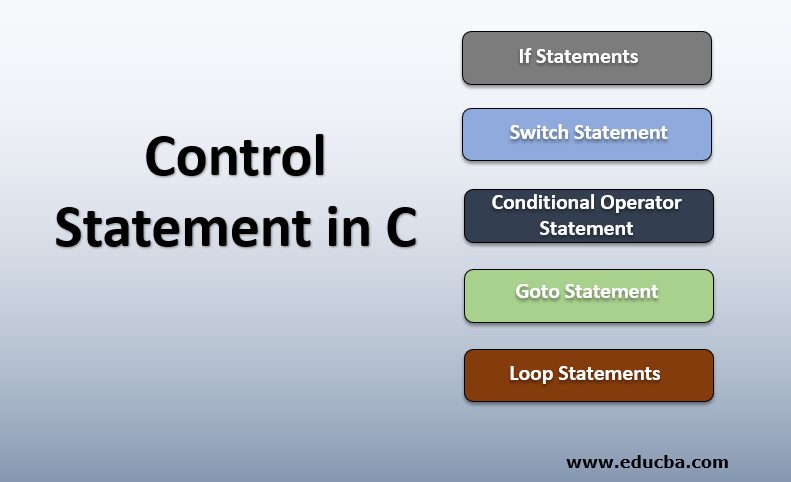Updated March 18, 2023

Introduction to Control Statements in C
In C, the control flows from one instruction to the next instruction until now in all programs. This control flow from one command to the next is called sequential control flow. Nonetheless, in most C programs the programmer may want to skip instructions or repeat a set of instructions repeatedly when writing logic. This can be referred to as sequential control flow. The declarations in C let programmers make such decisions which are called decision-making or control declarations. Below we will discuss the types of Control Statements in C.
Types of Control Statements in C
C also supports an unconditional set of branching statements that transfer the control to another location in the program. Selection declarations in C.
- If statements
- Switch Statement
- Conditional Operator Statement
- Goto Statement
- Loop Statements
1. If Statements
If statement enables the programmer to choose a set of instructions, based on a condition. When the condition is evaluated to true, a set of instructions will be executed and a different set of instructions will be executed when the condition is evaluated to false. We have 4 types of if Statement which are:
1. If..else
2. Nested if
3. Else if ladder
4. Simple if or null else
5. Null else or Simple else
If…else Statement
In this statement, there are two types of statements execute. First, if the condition is true first statement will execute if the condition is false second condition will be executed.
Syntax:
If(condition)
{
Statement(s);
}
else
{
Statement(s)
}
StatementNested if
If the condition is evaluated to true in the first if statement, then the condition in the second if statement is evaluated and so on.
Syntax:
If(condition)
{
If(condition)
{
Statement(s);
}
Else
{
Statement(s)
}
}else if Ladder
The corresponding array of instructions is executed when the first condition is correct. If the condition is incorrect, the next condition will be verified. If all the specifications fail, the default block statements will be executed. The remainder of the ladder can be shown as shown below.
Syntax:
If(condition)
{
Statement(s);
}
Else if(condition)
{
Statement(s);
}
else if(condition)
{
Statement(s)
}
…
Else
{
Statement(s)
}
Statement(s);Null else or Simple else
If the programmer can execute or skip a set of instructions based on the condition value. The simple one-way statement is selected. A set of statements is carried out if the condition is true. If the condition is false, the control will proceed with the following declaration after the if declaration. Simple else statement:
Syntax:
If(condition)
{
Statement(s);
}
Statement(s);2. Switch Statement
C offers a selection statement in several ways as if the program becomes less readable when the number of conditions increases. C has a multi-way selection statement called the switch statement that is easy to understand to resolve this problem. The switch declaration is easy to understand if more than 3 alternatives exist. The command switches between the blocks based on the expression value. Each block will have a corresponding value.
Syntax:
Switch(expression)
{
Case label1:
Statement(S);
Break;
Case label2:
Statement(S);
Break;
Case label3;
Statement(s);
Break;
….
Case labelN:
Statement(s);
Break;
Default:
Statement(s);
Break;
}Using the case keyword every block is shown and the block label follows the case keyword. The default block and the break statement are optional in a switch statement.
3. Conditional Operator Statement
C language provides an unusual operator, which is represented as a conditional operator.
Syntax:
(condition)? expr1: expr2Expr1 is executed when the condition is valid. Then Expr2 will be executed if the statement is incorrect.
4. goto Statement
goto statement is known for jumping control statements. It is used to transfer the control of the program from one block to another block. goto keyword is used to declare the goto statement.
Syntax:
goto labelname;
labelname;In the above syntax, goto is a keyword that is used to transfer the control to the labelname. labelname is a variable name. In this case, the goto will transfer the control of the program to the labelname and statements followed by the labelname will be executed.
5. Loop Statements
The programmer may want to repeat several instructions when writing C programs until some requirements are met. To that end, C makes looping declarations for decision-making. We have three types of loops,
- For Loop
- While Loop
- Do While Loop
For Loop
In the For loop, the initialization statement is executed only one time. After that, the condition is checked and if the result of condition is true it will execute the loop. If it is false, then for loop is terminated. However, the result of condition evaluation is true, statements inside the body of for loop gets executed, and the expression is updated. After that, the condition is checked again. This process goes on until the result of the condition becomes false. When the condition is false, the loop terminates.
Syntax:
for( initialization statement; condition)
{
//statements inside the loop
}While Loop
In C, the while loop is a guided entry loop. The body of the while loops is only performed if the condition is valid. The loop structure is not executed if the condition scores to incorrect.
The while loops are usually used when several instructions have to be repeated for an indefinite time.
Syntax:
While(condition)
{
//statements inside the loop
}Do While Loop
Unlike while loop, the body of the do is the difference between while and … while loop is guaranteed to be done once at a time.
Syntax:
Do
{
//statements inside the loop
}
While(condition);Conclusion
In this article, we have seen what are the various control statements in C along with their syntax and examples.
Recommended Article
This is a guide to Control Statements in C. Here we discuss the different types of Control Statements in C like If, Switch, Conditional Operator, goto and Loop along with syntax. You can also go through our other suggested articles to learn more –


